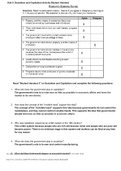HIST 1B
California State University - San Jose State University
All 34 results
Sort by
Unit 5_ Socialism & Capitalism Student Handout

-
HIST 1b Unit 5_ Socialism & Capitalism Student Handout
- Other • 4 pages • 2023
-
- $9.49
- + learn more
Unit 4: Sea-Based Empires Comparison 1450-1750 Spain Portugal Government Explain the process of state building and expansion. How did they build and manage their empires? Who was in charge? What type of govt? Spain used income from churches to expand imperial influence seized leverage from church appointments and used cathedrals to expand invasion. Portugal used an empire of men governed by rulers. They clashed regularly with Spain. Trading Posts and/or Colonies Established Spain ...

-
HIST 1b Unit 6 - Indian Revolt of 1857 Handout
- Other • 4 pages • 2023
-
- $8.49
- + learn more
Why were Europeans interested in colonizing this area? What factors were driving this new imperialism? What resources attracted European interest? Europe saw the colonization of Africa as an opportunity to acquire a surplus population, thus settler colonies were created. With this invasion, many European countries saw Africa as being available to their disposal. Resources that attracted the European are raw materials like rubber, timber, diamonds, and gold were found in Africa. P...
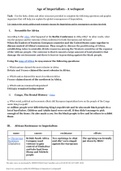
-
HIST 1b Impact of Imperialism - A webquest
- Exam (elaborations) • 5 pages • 2023
-
- $8.49
- + learn more
I. Scramble for Africa According to the video, what happened at the Berlin Conference in 1884-1885? In other words, what was the purpose and the outcome of this conference for both Europeans and Africans? When the leaders of fourteen European countries and the United States came together to discuss control of Africa’s resources. They sought to discuss the partitioning of Africa, establishing rules to amicably divide resources among the Western countries at the expense of the African peop...
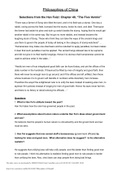
-
HIST 1b Philosophies of ChinaSelections from the Han Feizi: Chapter 49, "The Five Vermin
- Other • 4 pages • 2023
-
- $9.49
- + learn more
Philosophies of China Selections from the Han Feizi: Chapter 49, “The Five Vermin” “There was a farmer of Song who tilled the land, and in his field was a stump. One day a rabbit, racing across the field, bumped into the stump, broke its neck, and died. Thereupon the farmer laid aside his plow and took up watch beside the stump, hoping that he would get another rabbit in the same way. But he got no more rabbits, and instead became the laughing stock of Song. Those who think they can ...
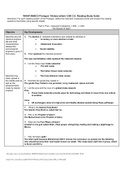
-
HIST 1b Copy of Post Classical Era 600 ce- 1200ce
- Exam (elaborations) • 5 pages • 2023
-
- $10.49
- + learn more
Objective Key Developments Describe why the classical empires fell and what characteristics allowed the post-classical empires to grow in their place. Describe how Islam spread in the middle east as well as the advancements made by Islamic empires. A. The decline of classical civilizations was marked by declines in: a. A century or more decline in trade b. Intellectual innovation c. Social stability. B. What replaced the classical empires? The new centralization state replac...
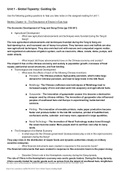
-
HIST 1b - Unit 1 - Global Tapestry_ Guiding Qs
- Exam (elaborations) • 5 pages • 2023
-
- $10.49
- + learn more
Unit 1 - Global Tapestry: Guiding Qs Use the following guiding questions to help you take notes on the assigned reading for Unit 1. Bentley Chapter 14 - The Resurgence of Empire in East Asia The Economic Development of Tang and Song China (pp 335-341) ● Agricultural Development ○ What new agricultural advancements and techniques were founded during the Tang & Song? The new agricultural advancements and techniques founded during the Tang & Song are fast-ripening rice, and increased us...
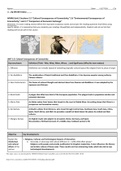
-
HIST 1b 2.5-2.7 Reading Questions.
- Exam (elaborations) • 7 pages • 2023
-
- $10.49
- + learn more
Key term/event Definition (Think - Who, What, When, Where…) and Significance (Why this term matters) 1. Diffusion (Definition not in book) Spread of something (typically cultural aspect like religion) from its place of origin 2. Zen Buddhism The combination of Daoist traditional and Chan Buddhism. It has become popular among ordinary Chinese citizens. 3. Neo-Confucianism The fusion of rational thought and abstract ideas from Daoism and Buddhism. It was adopted by the Japanese and Vietnam....

-
HIST 1b Unit 6_ Imperialism from 1750-1900.
- Other • 4 pages • 2023
-
- $8.49
- + learn more
CAUSES Why were Europeans interested in colonizing this area? What factors were driving this new imperialism? What resources attracted European interest? Europe saw the colonization of Africa as an opportunity to acquire a surplus population, thus settler colonies were created. With this invasion, many European countries saw Africa as being available to their disposal. Resources that attracted the European are raw materials like rubber, timber, diamonds, and gold were found in Af...
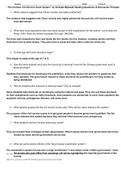
-
HIST 1b Examination System - Discussion Q_s latest 2023
- Exam (elaborations) • 3 pages • 2023
-
- $9.49
- + learn more
“The Chinese Civil Service Exam System” by Ichisada Miyazaki Reading Questions & Discussion Prompts 1. What evidence suggests that China’s society was highly patriarchal? The evidence that suggests why China’ society was highly patriarchal because the civil service exam excluded women. 2. What were boys expected to learn and study as part of their preparations for the exams? List at least five things. (Hint: there are several examples from pgs. 288-290) The boys were expected to le...

Study stress? For sellers on Stuvia, these are actually golden times. KA-CHING! Earn from your study resources too and start uploading now. Discover all about earning on Stuvia

